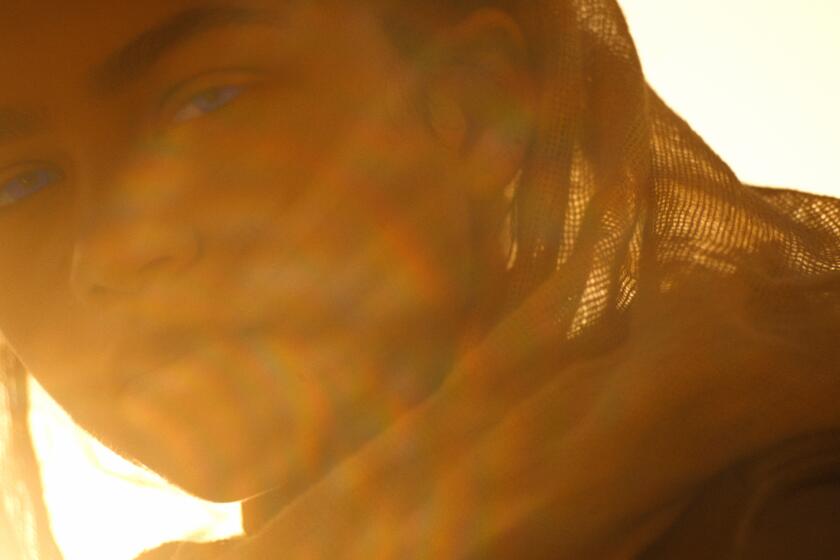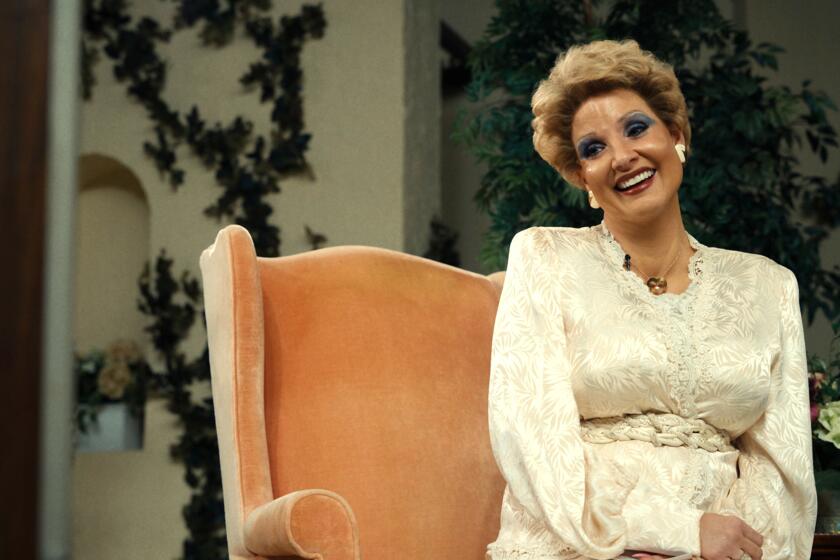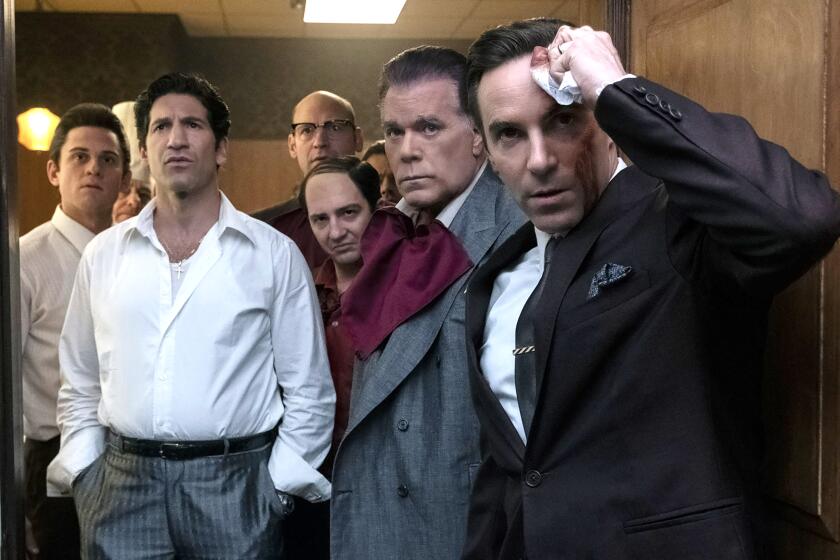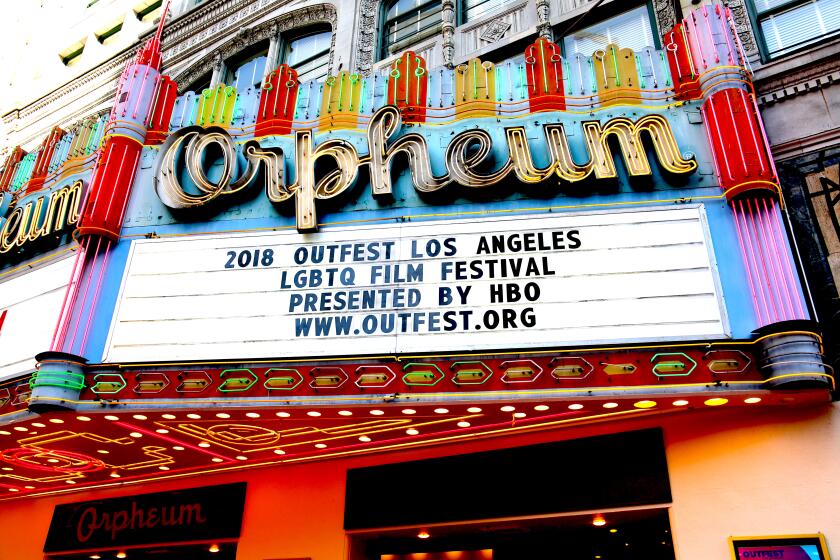Review: Denis Villeneuve’s ‘Dune’ is a transporting vision, but it could use a touch more madness

The Times is committed to reviewing theatrical film releases during the COVID-19 pandemic. Because moviegoing carries risks during this time, we remind readers to follow health and safety guidelines as outlined by the Centers for Disease Control and Prevention and local health officials.
The story in “Dune” is set in motion by an ambitious, unwieldy and ill-advised transfer of power — an undertaking that extracts a terrible cost and seems doomed to end in frustration and defeat. Something similar might be said of the previous major attempts to wrest Frank Herbert’s 1965 literary colossus to the big screen, even if recent history has sometimes looked back on those failures with a forgiving smile. Alejandro Jodorowsky’s assuredly trippy, never-completed version has become a much-mythologized cinematic ruin. David Lynch’s 1984 flop, reviled by many (including Lynch himself), can still inspire spasms of admiration for its mix of narrative intransigence and visionary strangeness.
Still, to the extent that “Dune” endures, it does so on the strengths of Herbert’s extraordinarily prescient work — its echoes of a real world ravaged by oil wars, climate change and other consequences of human greed — rather than anything to do with its dubious cinematic legacy. Not least among the book’s mysteries is that it has shaped the iconography of so many classic science-fiction and fantasy films — most obviously, though not exclusively, “Star Wars” — without yielding a classic of its own. Conventional wisdom has long held that “Dune” is unfilmable, that its interlocking parables of colonial oppression, ecological disaster and messianic deliverance are too vast to be contained within the flattening parameters of the cinema screen.
The magisterially brooding new “Dune,” just unveiled at the Venice International Film Festival and slated to reach U.S. theaters and HBO Max subscribers Oct. 22, boldly seeks to reverse that prophecy. With methodical poise and seat-rattling spectacle, the French Canadian filmmaker Denis Villeneuve (who wrote the script with Jon Spaihts and Eric Roth) draws you into an astonishingly vivid, sometimes plausibly unnerving vision of the future. If those cursed earlier stabs at “Dune” were examples of what the French call a “film maudit,” this imposing new vision aspires to be the opposite: perhaps a “film Mahdi,” to reference the Arabic word often hurled at the young savior-to-be, Paul Atreides (Timothée Chalamet), as he embraces his destiny.
The new film “Dune” ends on a cliffhanger. With the second half of Frank Herbert’s classic story still to tell — not to mention all its sequels and prequels — where will the “Dune” universe go from here?
The fulfillment of that destiny will have to wait; “Dune: Part One,” as it’s billed onscreen, is the first in a projected two-part adaptation, which means that any assessment of Villeneuve’s achievement must be provisional at best. For now, it’s hard to deny the excitement of feeling swept up in this movie’s great squalls of sand, spice and interplanetary intrigue, realized with a level of craft so overpowering in its dust-choked aridity that you may want to pull your mask up a little tighter in the theater. You may also feel a more qualified sense of admiration for Villeneuve’s efforts to preserve yet streamline the novel’s imaginative essence, to translate Herbert’s heady conceits and arcane nomenclature into a prestige blockbuster idiom.
Whether he succeeds — and for an impressive stretch, I think he does — his own meteoric Hollywood ascent has clearly prepared him for the assignment. This isn’t the first time Villeneuve has evinced a superb eye for the textural and chromatic nuances of sand, as the Mideast deserts of “Incendies,” the U.S.-Mexico border zones of “Sicario” and the Las Vegas ruins of “Blade Runner 2049” will attest. And like “Blade Runner 2049” and especially “Arrival,” “Dune” is an unusually philosophical speculative fiction that ponders the difficulties of language and coexistence.
As the movie opens, a superficial detente has been orchestrated between the warring royal strongholds of Atreides and Harkonnen, led respectively by the noble Duke Leto Atreides (Oscar Isaac) and the grotesque Baron Vladimir Harkonnen (a prosthetically transfigured Stellan Skarsgard). “Dune” heads will know the rest: By imperial decree, House Harkonnen must relinquish stewardship of the desert planet Arrakis, a.k.a. Dune, which is at once inhospitable to life and a much-coveted source of it. House Atreides will assume control of the planet as well as its rich concentrations of spice, a drug-like substance whose life-extending properties have made it the most prized commodity in the universe.
Heralded as the best sci-fi novel of all time, previous adaptations of Frank Herbert’s ‘Dune’ have fizzled. Now it’s Denis Villeneuve’s turn.
Notably, these narrative preliminaries are laid out by Chani (Zendaya), one of the Fremen, the thick-skinned, blue-eyed Indigenous people of Arrakis. Long acclimated to the planet’s sweltering heat and deadly giant sandworms, they’ve suffered bitterly under their cruel Harkonnen overlords and have no reason to suspect the Atreides will be any different. Villeneuve’s sympathetic focus on the Fremen feels like an early declaration of principle, a promise that this “Dune” might radically reframe the story from their perspective. For much of the movie, though, Chani and her people remain fleeting presences, glimpsed only in the gauzy visions of Duke Leto’s son, Paul.
Chalamet, always good at suggesting both youthful callowness and limitless potential, proves an inspired choice for the role of a young man who is both a coddled heir and an intriguingly unknown quantity. On the Atreides’ home planet of Caladan, he is trained with avuncular affection by his father’s retainers, including the brilliant security expert Thufir Hawat (Stephen McKinley Henderson), the brawny swordmaster Duncan Idaho (Jason Momoa) and the skilled weapons teacher Gurney Halleck (Josh Brolin, not exactly the “ugly lump of a man” described in the book). Paul is also a source of pride and anxiety for the Duke, movingly played by Isaac as a leader who longs to do right by his family, his people and the Fremen, even as he suspects that House Atreides might be stepping into a carefully laid trap.
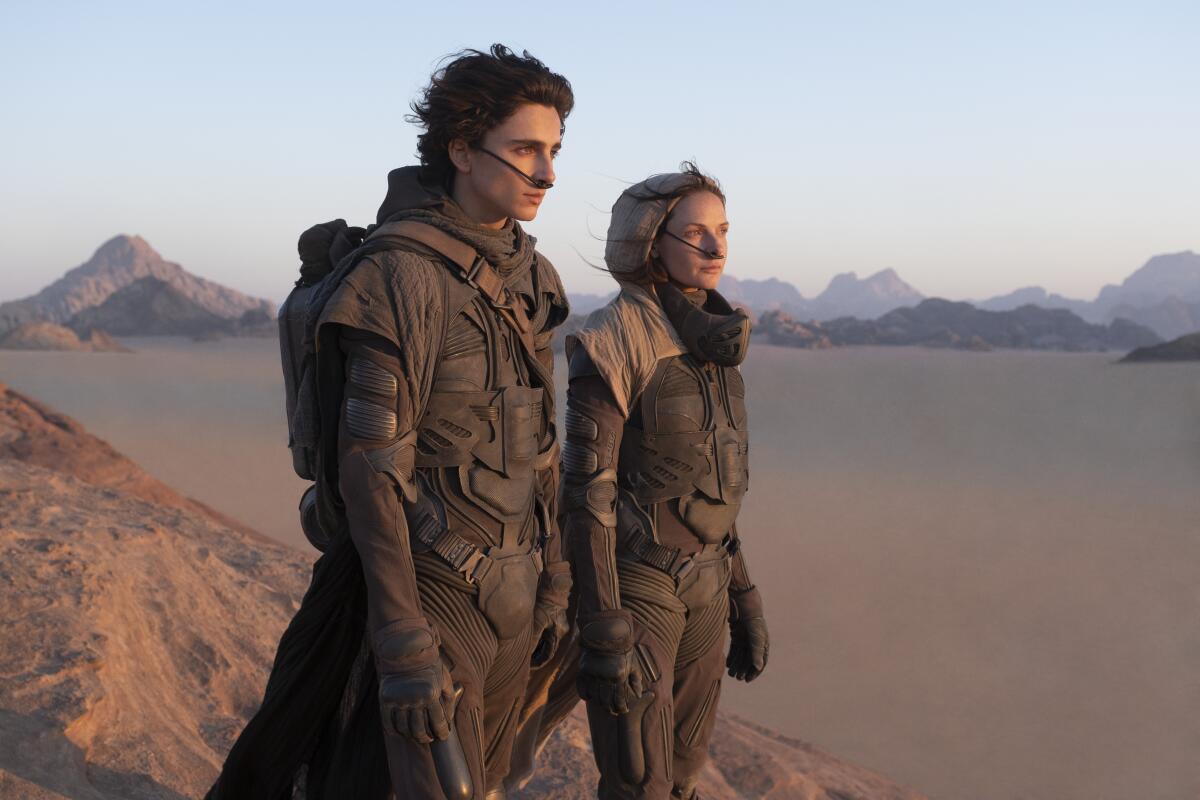
But Paul’s most important mentor is his mother, Lady Jessica (a superb Rebecca Ferguson), a member of a shadowy, oracular sisterhood known as the Bene Gesserit for whom Paul poses both a problem and a source of fascination. Led by an imperious Reverend Mother (a heavily veiled but unmistakable Charlotte Rampling), the Bene Gesserit are versed in many skills including “the Voice,” a form of mind control rendered here via menacing aural distortions that — along with the soundtrack’s low, ominous rumbles and Hans Zimmer’s pulsating score — make “Dune” a symphony for the ears as well as a feast for the eyes.
It is, admittedly, a rather monochromal feast, dryer than it is rich, notwithstanding a luscious early shot of the Arrakis dunes that brings to mind the crisped swirls of an overbaked meringue. Much of the palace intrigue plays out in muted tones and symmetrical compositions (the cinematography is by the great Greig Fraser), part of a rigorously color-controlled aesthetic that extends to Patrice Vermette’s futuro-brutalist production design and Jacqueline West’s slickly utilitarian costumes. A cold, fascist sheen seems to cling to the Atreides’ regal formations and their state-of-the-art ornithopters (like helicopters, but with blades that flutter like insect wings), all flawless design elements in a pageant of technological might and militaristic order.
Villeneuve means to subvert and disrupt that pageant, something he accomplishes in part by consciously elevating the women in this male-dominated story. Ferguson’s forceful presence in the expanded role of Lady Jessica is one example; another is the gender recasting of Liet Kynes (a striking Sharon Duncan-Brewster), Arrakis’ deeply knowledgeable planetologist. It’s Kynes who helps the Atreides adjust to their desert environs, at one point accompanying them to a spice-harvesting site where they get their terrifying first glimpse of a giant sandworm in action, its great maw swirling open like a raging quicksand vortex.
This action sequence and others are handled with masterly assurance, including several scenes of intimate combat performed with form-fitting, blood-concealing energy shields. But as ever, Villeneuve’s true talent is less in the staging of violence than in the queasy anticipation of it; he loves to linger in the looming threat of mayhem, in the tense moments before the (sand)worm turns. That gift serves him well enough in “Dune,” whose plot hinges on encroaching threats, assassination attempts and a series of devastating betrayals that send Paul and Lady Jessica fleeing into the desert where there await still more perils, possibilities and encounters with the Fremen (led by a sly Javier Bardem).
“Dune” director Denis Villeneuve discusses several significant departures from the sci-fi classic source material.
Until the movie slams to an abrupt, unsatisfying halt halfway through the events of Herbert’s novel, there’s pleasure in watching this particular game of thrones play out, though perhaps more pleasure than depth or meaning. To call this “Dune” a remarkably lucid work is to praise it with very faint damnation. Perhaps reluctant to alienate the novices in the audience, Villeneuve has ironed out many of the novel’s convolutions, to the likely benefit of comprehension but at the expense of some rich, imaginative excess. Herbert’s more memorable flights of linguistic fancy, like “gom jabbar” and “Kwisatz Haderach,” are spoken once, with a faint air of embarrassed obligation, and seldom mentioned again. A more significant casualty is the book’s layered interiority, its skill at turning unspoken perceptions and motives into drama; the writers have managed this material without mastering it.
Lynch’s compromised version was similarly stymied and more clotted with exposition. But it also had the courage of its demented convictions, as well as a fearless commitment to feverish, pustular imagery that makes Villeneuve’s pristine filmmaking seem almost timid by comparison. Not for the first time, his craft seems to exist mainly for its own sake; it’s the hallmark of a filmmaker who’s more logistician than thinker, more technician than artist. As a visual and visceral experience, “Dune” is undeniably transporting. As a spectacle for the mind and heart, it never quite leaves Earth behind.
And perhaps that’s as it should be, at least at this early stage. With any luck, there will be more to see and much more to think about in “Dune: Part Two,” the completion of which will depend to some degree on this first movie’s fortunes. Will “Dune” conjure enough coin — the spice of the Hollywood realm — to see itself through to completion? I suspect it might, in part because I doubt Villeneuve, a filmmaker more dependable than he is interesting, has it in him to add to “Dune’s” string of memorably catastrophic failures. Dust has long been his truest cinematic habitat, and to dust may he return.
‘Dune: Part One’
Rated: PG-13, for sequences of strong violence, some disturbing images and suggestive material
Running time: 2 hours, 35 minutes
Playing: Starts Oct. 22 in general release and on HBO Max
